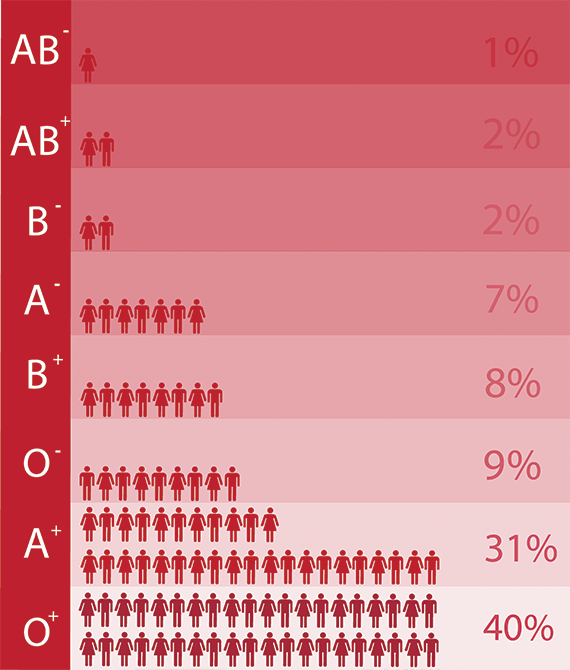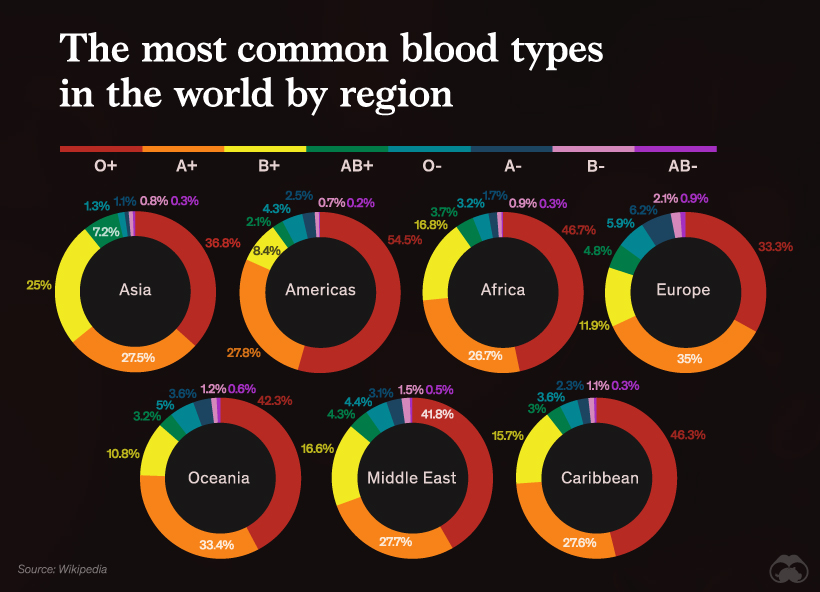

A persons blood group is determined by a pair of genes - one gene inherited from each parent. O-negative blood type is most common in the U.S. It is the presence of A and B antigens and corresponding antibodies that determines your ABO blood group. The 4 different blood groups in the ABO system are A, B, AB and O. That’s why giving someone blood from the wrong ABO group can be life-threatening. They recognise any ‘foreign’ antigens and tell your immune system to destroy them. You also have antibodies in the clear part of blood called plasma.Īntibodies are important in transfusion because they are the body’s natural defence system. Type O blood is required and must be available in inventory for newborn babies and emergency. Which group you belong to depends on the antigens and antibodies in your blood.Īntigens are a combination of sugars and proteins that coat the surface of a red blood cell.ĭepending on your combination, you will have: Patients with any blood type can receive O negative blood. There are four main blood groups in the ABO group system.Įach group is important and we need donors from every group to ensure we have the right blood for the people who need it. The ABO group system gives the letter part of your blood type and Rh system gives the positive or negative part. The two most important blood group systems for transfusion are ABO and Rh. To make an appointment, visit this link (SingPass login is required) or call 6220 0183.Your blood group is inherited from genes passed on by your parents.
O NEGATIVE BLOOD PERCENTAGE FULL
Scroll down to view what’s unique about your blood group! To view the full infographics for each blood type, visit our Blood Types Album. If you have donated blood before, you can check your blood group by visiting the online portal (SingPass log-in is required) How do I know what’s my blood type? How is it determined?ĪBO and Rhesus testing is performed on each and every unit of blood donated to ensure patient-blood compatibility.

Rhesus-negative blood is considered rare and precious because patients who have such blood are recommended to receive Rhesus-negative blood.įor the breakdown of who you can donate your blood to, scroll to the bottom of this page!ģ. In Singapore, most people are Rhesus positive (A+, B+, O+, AB+), and less than 1% of the population are Rhesus negative (A-, B-, O- and AB-). So what’s the population like for the different blood groups in Singapore? Each red cell has more than a million markers on its surface.Ģ. This results in a total of eight main blood groups: A+, A-, B+, B-, O+, O-, AB+ and AB-.įUN FACT!: Each drop of blood contains 200-300 million red blood cells. Within the Rh system, depending on the presence or absence of RhD antigen, you can be either RhD positive (+) or RhD negative (-) If you are group A, this means A markers are present on the surface of your red cells group AB means both A and B markers are present on the surface of your red cells while group O means there are no A or B markers on the surface of your red cells. Within the ABO system, there are four main groups - A, B, O, AB - determined by the presence or absence of A and B antigens on the surface of red blood cells. How many blood groups are there? What do the ‘letter’, ‘+’, and ‘-’ mean?ĪBO and Rhesus (Rh) are the two most important blood group systems.įUN FACT!:There are near to 40 human blood group systems recognized by the International Society of Blood Transfusion (ISBT), with ABO and Rh being just two of them. Ever wondered why there are different blood groups? Which blood group is compatible with yours?īecause not all blood groups are compatible with one another, your blood is crucial to patients with a blood group that is compatible with yours.ġ.


 0 kommentar(er)
0 kommentar(er)
